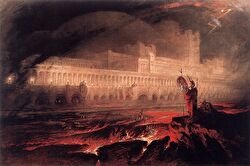
'That’s SO cool!” It was an excited 14 year-old speaking. All I had done was to tell her I was going to an event that the Queen would be attending.
This, surely, is one of the big changes of our time. When I was a teenager, I could have thought of few things more uncool than going to see the Queen. Mocking the Royal family was a staple of the 1960s satire boom. Johnny Rotten’s God Save the Queen marked the 1977 Silver Jubilee by comparing her – absurdly – to a “fascist regime”. Everyone could stomp to that one. One of the rather priggish boasts of the newly founded Independent newspaper in 1986 was that it stood aside from the whole royal pantomime, and it did quite well out of it for a while. But last week even the Guardian printed a supplement to celebrate the Diamond Jubilee.
In her old age, Queen Elizabeth II is held in an affection which 15 years ago, at the height of the hysteria following the death of Diana, was unimaginable. Now, we all love the Queen and the strangulated protests from republicans just sound like some petulant little boy stomping his feet and saying he hopes it rains on your birthday party.
How did this happen?
I asked the 14-year-old. “She’s a lovely old granny,” she said. This is quite obviously part of the explanation: who can dislike a benign old lady? The republican objection (which, until a few years ago, I shared) is not to the Queen personally, but to what she represents – a family whose eminence is entirely due to feudal convention and happenstance of birth, neither of which has any place in a modern democracy. It doesn’t matter how clever, how idealistic, how generous, you are, you will never be one of them.
But the 14 year-old’s point was slightly more complex. “She’s a granny and she reminds me of old Britain,’’ she said.
Now we begin to get to the nub of the matter. The presence of a little old lady on the throne anchors the present very visibly in the past. In an age of astonishing technological change and dissolving national borders, she offers up to us a sense of who we are.
In the eyes of the Roundheads – of whom, as I say, I was previously one – this is generally characterised as attaching a ball and chain to our ankles and requiring us to walk backwards into the future. The latest arsenic-dusted cake to be brought to the jubilee tea party is The Grand Delusion, by the retired academic Stephen Haseler, published later this year. The old Cromwellian sees the evil hand of monarchy behind everything from the humiliation of Suez and the tragedy of Afghanistan to the malign influence of the class system and the decline of British manufacturing.
Well, of course, no one designing a constitution for the 21st century would end up with this sort of system for choosing a head of state. Duh! as the 14 year-old might say.
A modern state should choose its leaders by popular vote, preferably with all candidates required – as in the London mayoral elections – to fight their corner in televised hustings.
Let us imagine the line-up. At the first of the lecterns, Cliff Richard. At the second Gary Lineker. At the third? Yes, it’s Miriam Margolyes. At the fourth, the white locks of the sainted Andreas Whittam Smith. Who knows, perhaps Tony Blair could fit a bit of being president into his busy schedule?
But why bother? Why take the risk of a worthy bore or some vainglorious politician getting the job? The Queen is there by a process which, while we certainly wouldn’t invent it, we can at least understand.
On top of that, the Queen has played a blinder. When asked the inevitable question of who I should most like to interview, the Queen is generally somewhere near the top of the list. But the truth is, I think she should never, ever, give an interview: the private secretary or prime minister who recommends such a thing should be banged up in the Tower for the rest of their natural life. What the Queen thinks is immaterial – that’s not her job – and the moment she expresses an opinion she will alienate someone or other.
Some years ago, researching a book on why we still have a monarchy, I searched high and low for examples of controversial statements made by the Queen. Not only did I fail to find anything contentious, I could hardly dig up anything even particularly interesting. In 60 years, that is a stunning achievement, and one which other members of her family might do well to try to emulate.
So, if you want a thundering speech about national destiny, full of rolling phrases and blustering promises, send for one of our politicians. Want a bypass or hospital opened? Invite Her Majesty.
It has played out like this since before Walter Bagehot’s Victorian division of the constitution into one part which is “dignified” and another which is “efficient”. Of course the system’s illogical and undemocratic and unfair. We don’t have hereditary vicars, nurses, VAT inspectors or bin men. But then who’d want the job? Every little girl dreams of becoming a princess. They usually manage to grow out of it. (Apart from some students at St Andrews, obviously…)
Once you have given the grubby business of law-making to those willing to chance their fate to the electorate, all that is left to the monarch is a Dead Sea fruit, a gorgeous empty shell with nothing much inside. The task is not the making of unlikely promises but a sort of gracious, biddable impotence. Who knows what goes through the Queen’s mind as she sits on the throne in the House of Lords, reciting another list of proposed laws from the latest bunch to occupy the government benches? What is unarguable about the ceremony is that she has invested the humdrum with moment.
So here’s the paradox. We require those who want to tell us what to do to put themselves to the inconvenience of being elected: to achieve anything they need first to cultivate popularity. For royalty, popularity is neither here nor there. Yet, even in well into her eighties the Queen continues the dutiful visits, openings, and commemorations. When a politician pays a visit, who can help wondering, “What’s he after?” We know there is nothing in any of these activities for the Queen. As a consequence she is incomparably more popular than any politician.
Of course, it helps that her main job is to make us feel better about ourselves. But she has accomplished something rather improbable. We think we know this most remote of citizens.
This Jubilee year also marks the 60th birthday of anyone born in 1952. Elizabeth was on the throne when baby-boomers learned to walk, and she is on the throne as they prepare to collect their pensions. The luckiest generation in history once affected disaffection. The Queen is a beneficiary of the fact that many have at last begun to appreciate their good fortune. We have all grown up in her company, as she has developed from nervous young queen to gracious granny.
The familiarity is an illusion, of course, for her presence is remote, her formality antique, and – above all – there is only one of her and there are very many of us. Yet because of the mechanism by which she acquired the role, she expresses not merely the latest generation of a uniquely privileged family, but a sense that the whole nation is somehow an extended family.
It’s an idea of ourselves which is a lot easier to live with than flags and anthems, mission statements or slogans.
Yes, she’s pretty cool.
Article courtesy of The Daily Telegraph. Original found here.


